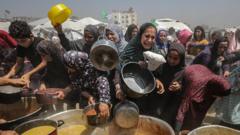An assessment from the Integrated Food Security Phase Classification (IPC) highlights the critical state of food security in Gaza, where the blockade and renewed conflict have severely exacerbated the humanitarian crisis, placing millions on the brink of starvation.
Severe Food Insecurity Threatens Gaza's Population, UN Reports

Severe Food Insecurity Threatens Gaza's Population, UN Reports
A recent UN-supported assessment has identified Gaza's 2.1 million residents as facing an alarming risk of famine due to ongoing food insecurity and a blockade on aid.
The Integrated Food Security Phase Classification (IPC) has published a dire report indicating that the entire population of Gaza, approximately 2.1 million individuals, is at a "critical risk" of famine amidst severe food insecurity. The Israeli blockade on humanitarian aid, in effect for over two months, has significantly worsened conditions, with the report showing a stark decline since October 2024. Although the analysis concluded that an official famine has not yet been declared, the current situation is precarious.
According to the IPC, currently, about 244,000 people are enduring "catastrophic" levels of food insecurity, prompting urgent calls for action to stave off an impending famine. The blockade has kept essential supplies like food and medications from entering the region for over 70 days, as Israel asserts that this pressure is necessary to compel Hamas into negotiations about hostages.
Internationally, the blockade has drawn widespread condemnation, with accusations of it constituting a war crime or a deliberate starvation tactic. The IPC’s findings describe about half a million people—roughly one in five in Gaza—facing starvation, and projections indicate that nearly 71,000 children under five are expected to suffer from acute malnutrition in the coming months. Many families, the report states, are resorting to desperate measures, including scavenging and begging for food.
The IPC assessment is part of a broader initiative that combines efforts from various UN agencies, non-governmental organizations, and governments to monitor famine risks globally. According to the report, an overwhelming 93% of Gaza’s population, or approximately 1.95 million people, are now grappling with high levels of acute food insecurity.
Despite Israeli officials claiming that there is no hunger crisis thanks to aid deliveries during a recent ceasefire, the overall humanitarian situation continues to deteriorate. Amid these tensions, Hamas has announced plans to release Israeli-American hostage Edan Alexander, possibly as a step toward reaching a ceasefire that would allow further humanitarian aid into Gaza.
Jordan's prime minister characterized the humanitarian crisis as dire but said there is no commitment from Israel beyond allowing a "safe corridor" for hostage release. Meanwhile, reports indicate a potential escalation of military operations by Israel if an agreement is not reached soon, with plans that suggest a long-term military strategy in Gaza that involves significant territorial control and altered aid distribution methods.
The ongoing conflict began with devastating Hamas-led assaults on southern Israel on October 7, 2023, resulting in significant casualties and hostages. The repercussions of military actions have been catastrophic, with numbers from the Hamas-affiliated health ministry estimating over 52,000 fatalities in Gaza.

















